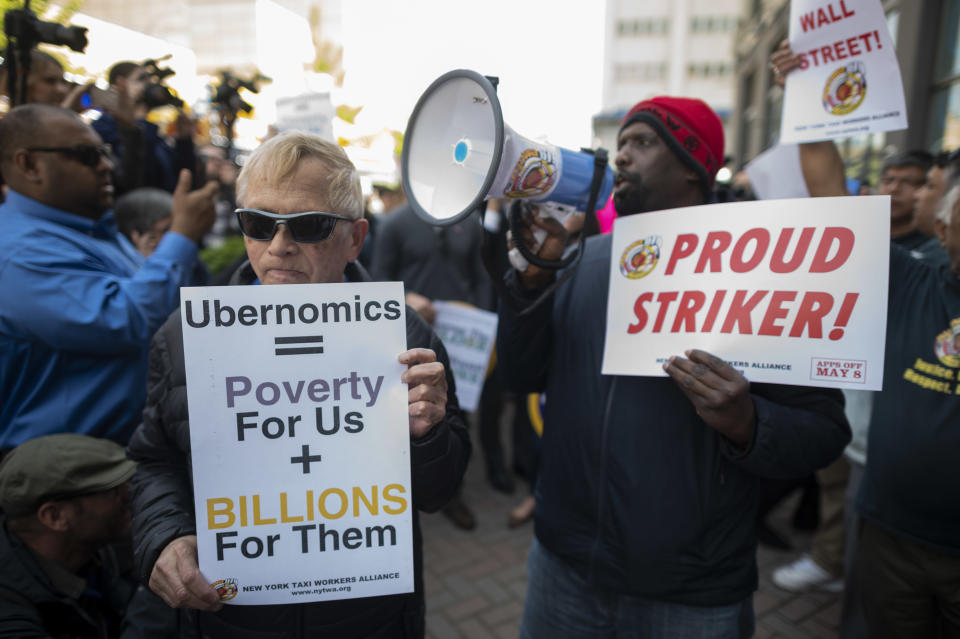Uber and Lyft 'cut costs at the expense of workers,' says California lawmaker
A new law in California has gone into effect, regulating ride-hailing companies like Uber (UBER) and Lyft (LYFT) for using subcontracting to avoid labor laws and for ignoring lawmakers concerned with their practices.
State legislator Lorena Gonzalez, who represents the California district encompassing San Diego and authored the new law, spoke to The Final Round on Monday about this controversial legislation and the changes she hopes it will effect not only in California, but across the nation.
AB-5 aims to prevent exploitation of gig workers
Assembly Bill 5 — also called AB-5 — only went into effect on January 1, 2020, but has been receiving a tsunami of criticism since its introduction last year. Most of this condemnation, which came from Uber and Lyft’s respective camps, was anticipated: the ride-hailing structure depends on the gig economy, where workers are hired as subcontractors rather than employees with full-time benefits.

But there was also disapproval from some gig economy workers. Though AB-5 aims to prevent the widespread exploitation of gig workers, many feel the legislation has instead taken away their freedom to choose.
California truck drivers have become some of the law’s most vocal critics. Categorization as an employee under AB-5 is mandatory: should an individual want to provide a service for money, they cannot opt out if they prefer independence.
This mandate, however, poses a significant threat to the trucking industry, whose workers largely operate independently. In November, The California Trucking Association, which represents around 70,000 truck drivers, challenged AB-5 in court, arguing that “the law will deny many truckers the ability to work as independent drivers in California who can profit from their own vehicles while setting their own schedules.” A federal judge agreed, temporarily exempting truckers from AB-5.
Companies ‘cut costs at the expense of workers’
Gonzalez, the principal author of AB-5, insists that the goal is to protect “more than a million Californians” who have been misclassified by employers “looking to cut costs at the expense of workers.”
“First, [Uber] tried to find an exemption to AB-5. They then said they just wouldn't abide by the law. Then they said it didn't apply to them,” Gonzalez said. “Then they said they'd do an initiative to exempt themselves out of the law — and now they are saying, of course, that it's unconstitutional,” says Gonzalez. “[But] Uber and Lyft have not changed their practices, and they're still subject to the law.”
According to Gonzalez, companies likes Uber and Lyft “will only make changes when they're forced to.” However, issues of corporate accountability remain unresolved.
“If you get hurt in a crash with an Uber driver, you know, who's paying your bill?” says Gonzalez. “You hope that driver has enough insurance to pay that because Uber says, hey, that's not our problem. You get raped in an Uber and Lyft — we're seeing this every single day with new lawsuits. Who's at fault? Who's actually the underlying employer? That's what AB-5 gets at.”
Gonzalez, who is aware of the grievances expressed by gig workers who find the law constrictive, said she hopes to modify AB-5 later in the year.
“If you are a small business, a sole proprietor, an LLC, and you actually have multiple clients, you can continue to do that with AB-5,” she says. “What you can't do is have a company say, ‘This individual is a small business but they're working for me exclusively. I'm setting their rates. I'm setting their working conditions, and I'm going to tell them when and how they can do it.’”
More from Olivia:
Fake news and political ads are bigger problems than hacking
A wealth tax is possible and America needs one
Warren's wealth tax would solve economic inequality
Facebook is challenging our democracy
Companies shouldn't be afraid to get involved in the election process
White House ‘incompetence’ on the U.S.-China trade war is concerning investors
Read the latest financial and business news from Yahoo Finance
Follow Yahoo Finance on Twitter, Facebook, Instagram, Flipboard, LinkedIn, and reddit.

 Yahoo Finance
Yahoo Finance 